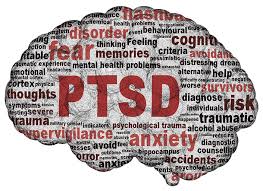PTSD – Post Traumatic Stress Disorder is mostly known as a condition of military personnel who have seen combat or observed extraordinarily gruesome events. The Anxiety and Depression Association of America (ADAA), estimates seven and a half million people live with PTSD in the US with twice as many women victims as men.
Symptoms include, but are not limited to: severe anxiety, depression, mood swings, sleeplessness and
even violence. Flashbacks to the events are common as is avoidance of situations or locations that might
trigger them. It can last for many years and severely affect not only the life of the person afflicted, but their
family and friends as well.
PTSD has now been linked with almost any disturbing event in a person’s life that affects their mental
well-being for long periods of time, such as: violence, sexual or mental abuse, work or auto accidents.
Severe health crisis events have also been linked to PTSD such as strokes, heart attacks and cancer.
Without proper professional help some victims try adjusting with negative coping mechanisms which tend
to work temporarily, but rarely stand the test of time and eventually cause other problems down the road.
The most common negative strategies include drugs and alcohol to quiet the thoughts.
Unfortunately, they can become addictive and worsen the problems.
In lieu of professionally based therapies such as:
CBT cognitive based therapy
mindfulness-based cognitive therapy (MBCT),
mindfulness-based exposure therapy, (MBET)
The following natural or holistic methods may help.
1. Meditation has been helpful for decades her in the US and may work wonders for PTSD and
many other disorders such as stress, anxiety, depression, high blood pressure, self-worth, and
moodiness. Several methods include using deep breathing techniques.
2. Exercise and physical activity can help burn off excess adrenaline based anxiety and along with
focused breathing may reduce stress. Walking, running, or taking up a sport can be very helpful
in reliving stress as well as releasing healthy hormones to repair both physical and mental
pathways. Anglia Ruskin University in Cambridge, UK researchers recommend surfing as a
challenging sport with great therapeutic results. Medical News Today also reported on a study
that suggested that Tai chi can help those suffering with PTSD.
3. The use of cannabis, or marijuana, for medicinal purposes including PTSD is becoming more and
more accepted within the medical community. One derivative of the industrial help plant (sister to
marijuana plant) is called DBD or Cannabidiol. It’s use in medical and mental applications is
becoming increasingly more popular due to the fact that is has no THC (the ingredient that gets
you high). Because there’s no THC, it is legal in most states and has few if any, negative
connotations. While still an emerging science, acceptance and agreement among researchers is
overwhelmingly positive.
4. Aromatherapy, according to some recent studies can be effective for some in the reduction of
PTSD symptoms such as stress and anxiety.
5. Art therapy seems effective in some according to research the past few years. It allows for a
person to express their feelings and work out their memories in various art forms such as
painting, drawing and sculpture.
6. Pet therapy has exploded over the last decade finding it’s way into children’s and seniors
hospitals, short and long-term nursing facilites, and even prisons. Now studies have proven pets
can soothe PTSD and other psychological disorders. Particularly effective are those animals
(usually but not limited to dogs) who are trained to recognize and deflect oncoming symptoms.
One study related that as little as one to two weeks with a specially trained dog may reduce
symptoms by 82%. Study participants and researchers report that when a patient begins to
become upset or have nightmares the dog intervenes by distracting them to refocus.
Sometimes just the act of petting the dogs calms them down immensely. The popularity of dog therapy is well
evidenced by the number of registered “companion” therapy dogs in this country.
For more specialized information about PTSD, coping strategies, and available resources, have a look at
the dedicated pages on the U.S. Department of Veterans Affairs and ADAA websites.




